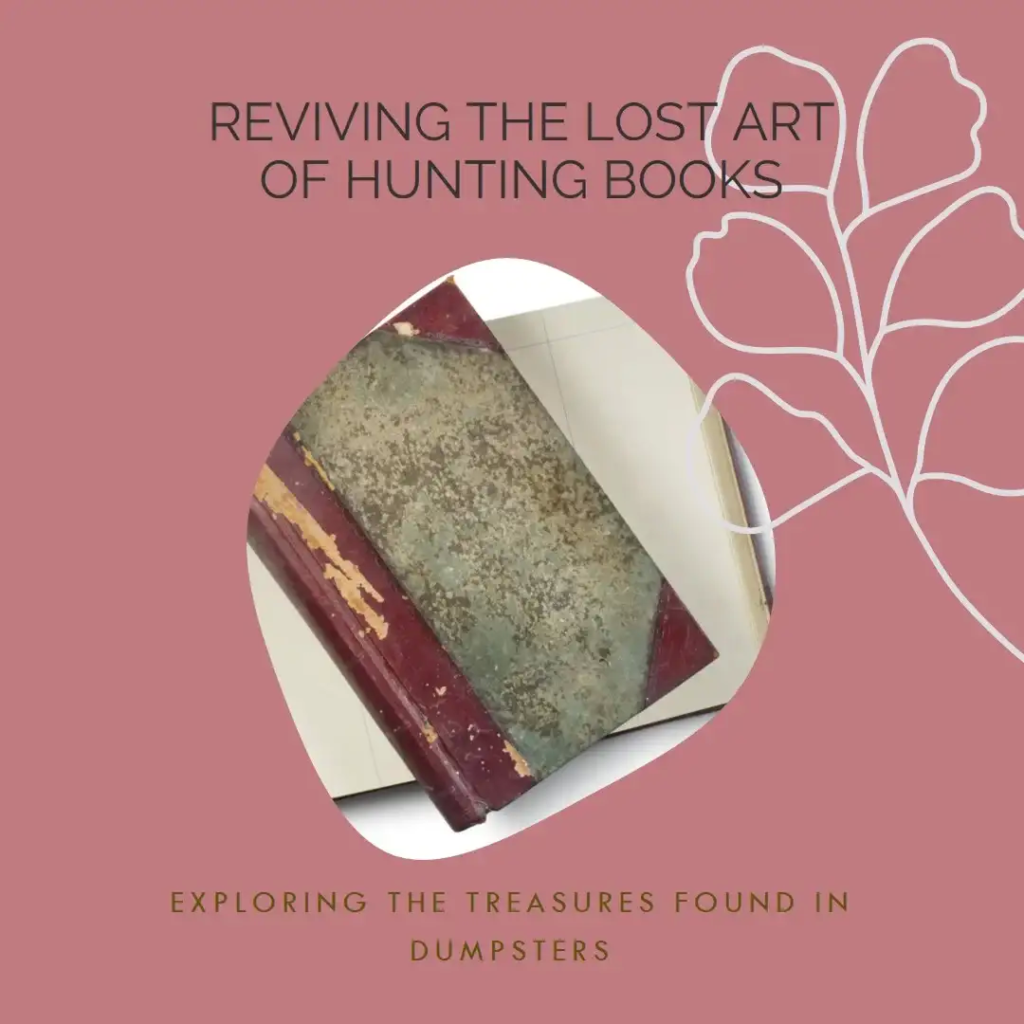In recent years, dumpster diving has emerged as an unconventional yet intriguing avenue for book enthusiasts seeking to expand their libraries without breaking the bank. This practice involves exploring dumpsters and waste disposal areas in search of discarded items, particularly books. The allure of dumpster diving lies in its unpredictability, turning each excursion into a unique treasure hunt with the potential to uncover literary gems.
Beyond its economic appeal, dumpster diving for books has gained popularity for its environmental sustainability, diverse book selections, and the excitement of discovering hidden treasures. This overview delves into the practice of dumpster diving specifically for books, exploring the reasons behind its popularity and the various benefits it offers to avid readers and sustainability advocates alike.
Benefits of Dumpster Diving for Books
Dumpster diving for hunting books can offer numerous benefits, such as:
- Cost-Effective Reading
- Dumpster diving provides an economical way to access a variety of reading materials without the financial investment typically associated with purchasing books.
- Environmental Sustainability:
- Rescuing discarded books contributes to environmental sustainability by reducing the amount of waste in landfills. It promotes the reuse and recycling of cardboard materials, aligning with eco-friendly practices.
- Diverse Book Selection:
- Dumpster Diving offers a diverse range of book genres and subjects. From fiction to non-fiction, classics to contemporary titles, divers can encounter a broad spectrum of reading materials.
- Treasure Hunt Excitement:
- The unpredictability of dumpster diving adds an element of excitement and adventure. Each dive is a unique treasure hunt, making the process engaging and potentially rewarding.
- Opportunity for Collectibles:
- Older editions, rare finds, or collectible books may surface during dumpster diving, providing an opportunity for enthusiasts to discover valuable and unique items.
- Community Engagement:
- Some divers use their findings to engage with the community. They may share books with neighbors, donate them to local libraries, or organize book exchange events, fostering a sense of community.
- Promotion of Recycling:
- Dumpster diving promotes the reuse and recycling of items that might otherwise be discarded. Finding a new home for books extends their lifecycle and reduces overall waste.
- Resale or Trading Potential:
- Books obtained through dumpster diving may have a resale or trading potential. Individuals can explore online platforms, local bookstores, or community events to exchange or sell their finds.
- Learning Experience:
- Engaging in dumpster diving for books can be a learning experience. Divers may come across different genres or authors they wouldn’t have encountered otherwise, broadening their literary horizons.
- Cultural and Historical Finds:
- Dumpster diving may unearth books that provide insights into the cultural or historical context of a particular time. These discoveries contribute to a richer understanding of diverse perspectives.
- Promotion of Minimalism:
- Dumpster diving aligns with the principles of minimalism by encouraging individuals to find value in pre-owned items rather than constantly acquiring new possessions.
- Personal Connection with Books:
- Discovering books through unconventional means fosters a unique and personal connection with each find, as divers often remember the circumstances and stories behind their uncovered treasures.
- Reduced Consumer Impact:
- By salvaging books that would otherwise be discarded, individuals participating in dumpster diving reduce their consumer impact, advocating for a more sustainable approach to consumption.
While dumpster diving for books offers numerous benefits, it’s crucial to approach this activity with respect for local laws, property rights, and personal safety. Always prioritize ethical and responsible diving practices.

Assessing the condition of hunting books found in dumpsters
When inspecting books during dumpster diving, a meticulous evaluation is crucial to ensure the quality meets expectations. Check for water damage like moisture or mold, which can affect readability. Examine covers and pages for tears, stains, or missing pages that impact reading or resale value. Note annotations or highlighting, considering personal preference. Evaluate the edition and publication date—older editions may be collector’s items. Assess binding integrity, as loose bindings may deteriorate over time. Sniff the book for mustiness, signaling potential damage. Thorough evaluation ensures each find aligns with your standards, enhancing the joy of your dumpster diving endeavors.
| Aspect | Consideration |
|---|---|
| Water Damage | Check for moisture or mold, affecting readability and longevity. |
| Cover and Pages | Examine for tears, stains, or missing pages impacting value. |
| Annotations/Highlighting | Note presence, as it may enhance or diminish the book’s appeal. |
| Edition/Publication Date | Consider the edition; older editions may have collector’s value. |
| Binding Condition | Assess for loose or damaged bindings that may deteriorate. |
| Smell | Sniff for mustiness or unpleasant odors, indicating potential damage. |
| Overall Evaluation | Thorough assessment ensures alignment with personal standards. |
This evaluation process is essential for identifying valuable and suitable books during your dumpster diving excursions.
How to Start Hunting Books for Beginners in Dumpster Diving?
Starting to hunt for books through dumpster diving can be an exciting venture for beginners. Here’s a comprehensive guide to help you embark on this unconventional book-finding journey:
1. Research Local Laws and Regulations
- Before you start, research and understand the laws and regulations regarding dumpster diving in your area. Some places may have restrictions or consider it trespassing.
2. Safety First
- Prioritize safety by wearing gloves and closed-toe shoes to protect yourself from potential hazards like sharp objects or broken glass.
3. Choose the Right Locations
- Focus on locations with a higher likelihood of discarded books, such as behind bookstores, libraries, university campuses, and educational institutions.
4. Time Your Searches
- Time your dives strategically. Late evenings or early mornings, when businesses close or dispose of items, might offer better chances of finding discarded books.
5. Bring Essential Tools
- Equip yourself with a flashlight, a grabber tool, and sturdy bags for collecting books. A grabber tool can help you reach items without diving too deep into the dumpster.
6. Be Respectful and Discreet
- Be discreet and respectful of the property. Avoid making a mess, and only take what you need. Respect any posted signs or private property boundaries.
7. Check Bins Strategically
- Start by checking bins or dumpsters behind bookstores, libraries, or educational institutions. Look for specific areas designated for discards.
8. Inspect Book Conditions
- Carefully inspect the condition of the books. Consider factors like water damage, mold, or general wear. Select books that are in acceptable condition for reading or potential resale.
9. Consider Donation Bins
- Some places may have separate donation bins. Always check if these bins are available and if they contain items that can be salvaged.
10. Respect the Environment
- Dumpster diving should not harm the environment or others. Dispose of any litter responsibly, and leave the area as you found it.
11. Develop a Selling or Trading Strategy
- If your goal is to sell or trade books, research online platforms, local bookstores, or community events where you can exchange or sell your finds.
12. Build a Network
- Connect with other dumpster divers or book enthusiasts. Online forums or local community groups can provide valuable tips, insights, and potential collaboration opportunities.
13. Adapt and Learn
- Dumpster diving is an evolving process. Learn from each experience, adapt your strategy, and refine your approach based on what works best for you.
14. Document Your Finds
- Consider documenting your finds, either through photos or a log. This can help you track your successes and learn more about where and when the best opportunities arise.
15. Maintain a Positive Attitude
- Approach dumpster diving with a positive attitude. It’s an unconventional activity, but with the right mindset, it can be a rewarding way to discover books and contribute to sustainability by giving discarded items a new life.
Remember, dumpster diving is not universally legal, and adherence to local laws and property rights is crucial. Always prioritize safety, respect, and responsible behavior in your pursuit of book treasures.
What types of books can you find in dumpster diving?
When engaging in dumpster diving for books, the types you may come across span a broad spectrum of genres. In the realm of fiction, you could stumble upon timeless classics, gripping tragedies, mind-bending sci-fi tales, fantastical adventures, thrilling action and adventure novels, perplexing crime and mystery stories, heartwarming romances, light-hearted humor and satire, spine-chilling horror narratives, and even entertaining comic books.
On the non-fiction side, your discoveries might include insightful biographies and autobiographies, personal memoirs offering glimpses into unique lives, practical cookbooks for culinary enthusiasts, real-life true stories that captivate the imagination, and self-help books offering guidance and motivation.
Dumpster diving presents a diverse array of potential literary finds, each dumpster serving as a unique trove of books from various genres and subjects. The exciting part lies in the unpredictability of the discoveries, making each foray into dumpster diving an adventure with the potential to uncover a wide range of reading material.

How much money can you make from the books?
The amount of money one can earn from selling books acquired through dumpster diving is subject to considerable variation. Individuals engaging in this activity may find themselves making approximately $200 to $500 per month, particularly when pursuing it on a part-time basis. The specific earnings are contingent upon several factors, including the condition of the books, the prevailing demand in the market, and the effectiveness of one’s sales strategy.
It is crucial, however, to approach dumpster diving with a sense of realism and tempered expectations, as the income derived from this endeavor can fluctuate and is by no means guaranteed.
Where can one find discarded books in dumpster diving?
You can find the discarded books near the following suggestion:
- Behind Bookstores
- Bookstores often discard damaged or unsold books.
- Look for bins or dumpsters located behind the store.
- Focus on establishments that regularly update their inventory or have clearance sales.
- Library Dumpsters
- Libraries may dispose of outdated or surplus materials.
- Check dumpsters near library loading docks or designated disposal areas.
- Some libraries may have separate bins for discards or donations.
- University Campuses
- Universities might discard textbooks, reference materials, or outdated publications.
- Explore dumpsters near academic buildings, bookstores, or library facilities.
- Be aware of any campus rules or regulations regarding scavenging.
- Educational Institutions
- High schools and other educational institutions may also dispose of books.
- Check dumpsters near school libraries, English departments, or administrative areas.
- Ensure compliance with any relevant local regulations.
- Community Recycling Centers
- Some areas have recycling centers where unwanted books end up.
- Verify with local recycling facilities and inquire about book disposal policies.
- Respect any rules regarding salvaging items from recycling centers.
Remember, always prioritize safety, hygiene, and legality when engaging in dumpster diving activities. Obtain permission when possible and be aware of any local ordinances or regulations regarding scavenging.
where to sell rare books?
Selling rare books is a nuanced process that requires a strategic approach. Begin by thoroughly assessing the value of your books, considering factors like edition, condition, and rarity. Research the market, understanding where your specific books might find the most interested buyers. Choose the right platform for your sale, whether it’s online marketplaces like eBay and Amazon, specialized rare book platforms, auction houses, local rare bookstores, or book fairs.
Prepare your books meticulously, setting a realistic price based on market demand and conditions. Effectively market and promote your books through detailed listings and engagement on social media platforms. Provide authentication and documentation to enhance buyer confidence, and carefully handle shipping and packaging. Be open to negotiation and maintain clear communication with potential buyers.
Consider legal aspects, seek professional advice if needed, and build a positive reputation over time. Patience is key, as the process of selling rare books may take time, but the rewards can be both financially and personally satisfying.
Conclusion
In conclusion, dumpster diving for books has evolved into a captivating and sustainable pursuit, drawing attention to its economic, environmental, and recreational benefits. This unconventional practice allows book enthusiasts to curate diverse collections without a significant financial investment, contributing to the reduction of waste and promoting a circular economy.
The allure of discovering hidden literary treasures during each dumpster dive adds an element of excitement, turning the activity into a unique and rewarding adventure. From classics to contemporary releases, fiction to non-fiction, the variety of genres and subjects encountered showcases the rich tapestry of discarded books awaiting a new chapter in their lifecycle.
The benefits extend beyond personal enjoyment, as dumpster diving fosters community engagement through book sharing, donations, and organized events. By giving discarded books a second chance, divers actively contribute to environmental sustainability, reducing the environmental impact of literary waste.
While the financial gains from selling books found in dumpsters can fluctuate, the potential for unique finds, collectibles, and the joy of unexpected discoveries make this pursuit more about passion and sustainability than monetary returns.
As you embark on your own dumpster diving journey, remember to prioritize safety, respect local laws, and maintain ethical practices. Happy hunting, and may your dives be filled with literary treasures that spark joy and curiosity.

Greetings, eco-conscious explorers! I am Arjun Bandari, a seasoned Dumpster Diving enthusiast with over a decade of expertise in uncovering hidden treasures amidst the discarded. My journey into this unconventional lifestyle began in New York, fueled by a passion for sustainability and a desire to challenge the norms of our throwaway culture.
With a bachelor’s in Enviromental Health and Safety, I seamlessly blend academic insights with practical experiences to navigate the world of Dumpster Diving. Over the years, I’ve become a recognized figure in the sustainable living community, sharing my discoveries and insights through workshops, community outreach, and various online platforms.
My commitment to promoting eco-friendly practices has garnered attention from local and regional media, earning me featured spots in publications that highlight the environmental impact of Dumpster Diving. As an advocate for responsible waste management, I have been honored with awards recognizing my contributions to the field.
In addition to my hands-on experiences, I’ve extended my reach through various published works, shedding light on the untapped potential within discarded items. Whether it’s repurposing furniture, salvaging electronics, or sharing practical tips for fellow Dumpster Diving enthusiasts, I am dedicated to inspiring a conscious and sustainable way of living.
Join me on this exciting journey as we redefine the narrative around waste, discover hidden gems, and collectively contribute to a greener, more sustainable future. Together, let’s dive into the world of Dumpster Diving and uncover the beauty beneath the surface of our disposable society.

